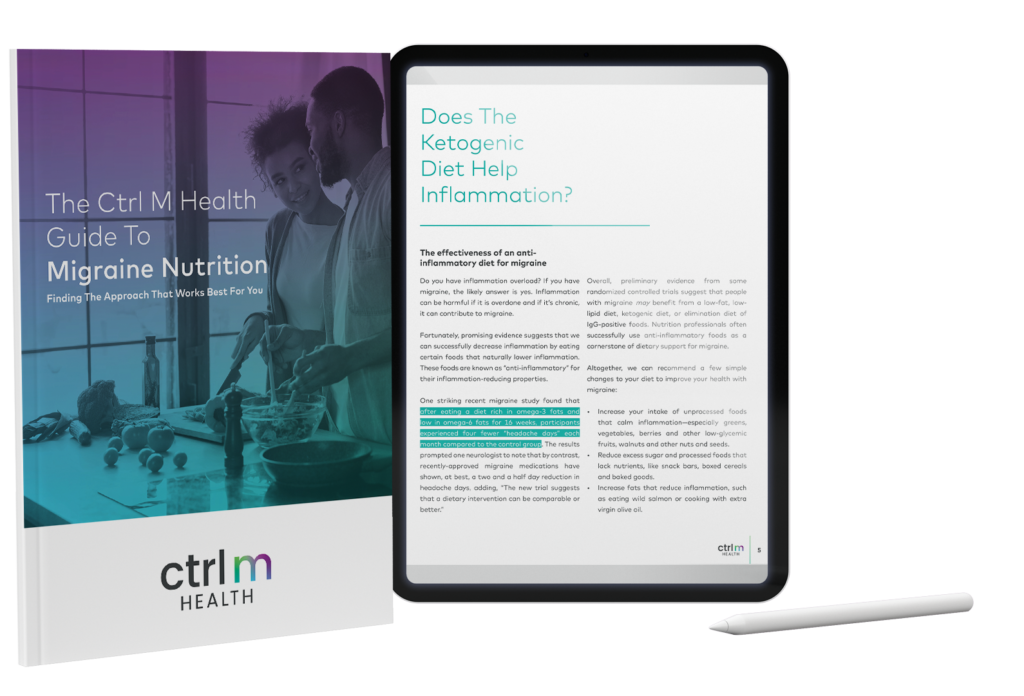Your body needs the right balance of vitamins and minerals to function properly. One of those micronutrients is the coenzyme Q10, also known as ubiquinone, but more commonly known as “CoQ10.” CoQ10 is an antioxidant produced naturally by the body, and is found in all human cells. It serves many purposes, including energy metabolism and being a key ingredient for the energy factories within each of our cells known as mitochondria. Mitochondrial dysfunction is thought to play a role in causing migraine. So it makes sense that headache researchers have been intrigued by the relationship between CoQ10 and migraine, and CoQ10’s potential as a supplement for headaches and migraine.
Is CoQ10 good as a migraine treatment?
Studies have shown that people with migraine are often deficient in certain micronutrients, like riboflavin, magnesium, and CoQ10. (Our body’s CoQ10 levels also naturally decrease as we age.) Although CoQ10 is found in foods like meat, fish and nuts, the amounts in these foods are too small to make a meaningful difference. Dietary supplements, however, can significantly increase the body’s levels of CoQ10. And although the literature on CoQ10 to prevent migraine is still growing, good studies have shown CoQ10’s effectiveness as a migraine dietary supplement.
-
- In a randomized, double-blind trial of 42 people with migraine, patients were given either 300 mg CoQ10 (taken in 100 mg doses three times per day) or a placebo. It found that after three months, 48% of the CoQ10 group experienced 50% fewer migraine attacks (as opposed to only 14% of the sugar pill group), fewer headache days, and fewer days with nausea.
-
- A randomized, double-blind study of 84 women with migraine gave each patient, in addition to their usual medications, either a placebo or 400 mg per day of CoQ10. After 12 weeks, the CoQ10 group showed significant improvement in the frequency, severity and duration of migraine attacks compared to the placebo group.
Research has found enough supporting evidence on the relationship between CoQ10 and migraine that a meta-analysis of six double-blind randomized studies concluded, “CoQ10 appears to have beneficial effects in reducing duration and frequency of migraine attack.” Based on the research and the clinical expertise of headache specialists, including those at the Jefferson Headache Center, the recommended CoQ10 migraine dose is 300 mg.
Side effects of CoQ10 and migraine
CoQ10 is a well-tolerated migraine supplement. Because it’s not easily absorbed by the body, it’s best to take a CoQ10 migraine dose with healthy fats such as nuts, seeds, and healthy oils, which considerably increases its absorption. Mild side effects may include digestive issues including nausea, diarrhea, and lack of appetite. However, you should not take CoQ10 if you are also taking blood thinners (anticoagulants) or statins, as the supplement can decrease those medications’ effectiveness.
It’s always a good idea to check with your doctor first if you’re considering taking any dietary supplements for the first time. This is especially important if you are pregnant, nursing, taking any medications, or have any medical conditions.
To learn more about the research behind CoQ10 and migraine, visit our CoQ10 research page.
For more about the links between diet and migraine, sign up to receive our free eBook: The Care Tuner Guide to Migraine Nutrition.
The Care Tuner Guide to Migraine Nutrition
Research shows that the types of foods we eat, and when we eat, have an impact on our migraine. Our new eBook helps you understand the link between migraine and nutrition.






